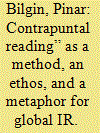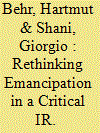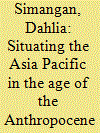|
|
|
Sort Order |
|
|
|
Items / Page
|
|
|
|
|
|
|
| Srl | Item |
| 1 |
ID:
145125


|
|
|
|
|
| Summary/Abstract |
How to approach Global International Relations (IR)? This is a question asked by students of IR who recognize the limits of our field while expressing their concern that those who strive for a Global IR have been less-than-clear about the “how to?” question. In this article, I point to Edward W. Said’s approach to “contrapuntal reading” as one way of approaching Global IR that embraces diversity and reflects multiple and overlapping experiences and perspectives of humankind. More specifically, I suggest that contrapuntal reading offers students of IR a method of studying world politics that focuses on our “intertwined and overlapping histories,” past and present; an ethos for approaching IR through raising the “contrapuntal awareness” of its students and offering an anchor for those who translate the findings of different perspectives; and a metaphor for thinking about Global IR as regional and global, one and many.
|
|
|
|
|
|
|
|
|
|
|
|
|
|
|
|
| 2 |
ID:
149111


|
|
|
|
|
| Summary/Abstract |
This article uses psychoanalytic object relations theory to construct a way to understand why interviews in IR research—viewed here as encounters between strangers—can be felt as “catastrophic.” The theory supports critical theoretical approaches that suggest that the world is structured through self–other relations and argues that encounters with “others” are unsettling because they can undermine the ways we constitute ourselves in relation to the wider world. Yet such challenges are inevitable if research is to challenge existing object constructions and the power relations that attend them. The article illustrates this argument with a detailed discussion of research interviews conducted in Zimbabwe.
|
|
|
|
|
|
|
|
|
|
|
|
|
|
|
|
| 3 |
ID:
182444


|
|
|
|
|
| Summary/Abstract |
This article seeks to reconceptualise emancipation in critically theorising International Relations (IR) by developing ‘thin’ and ‘thick’ versions of normativity and applying them as conditions for a pluriversal dialogue between different cosmologies. We start with the premise that ‘critical IR’ is both Eurocentric and a-normative, and argue that a normative engagement with critical discourses both inside and outside the West is necessary to recapture its emancipatory promise. Drawing on the work of Max Horkheimer, Herbert Marcuse and Jacques Derrida, we develop ‘thin’ and ‘thick’ versions of normativity. The former, we argue, operates as a critical corrective of thick normative positions, reclaiming their openness to difference, while not making substantive moral or political claims itself. We then apply these version of normativity to examine the possibility of a global pluriversal dialogue between different cosmologies. Cosmologies, we argue, refer to sets of ontological and epistemological claims about the human condition that are inherently normative. ‘Thin’ normativity applied to the ‘thick’ claims of cosmologies prevents the essentialisation and hierarchisation of cosmological difference(s) by revealing and de-constructing the latter’s potentially discriminatory, exclusionary, and violent tendencies. In so doing, it facilitates a global inter-cosmological dialogue which we regard as the objective of a post-western, critical IR.
|
|
|
|
|
|
|
|
|
|
|
|
|
|
|
|
| 4 |
ID:
170412


|
|
|
|
|
| Summary/Abstract |
The unprecedented and unsustainable impact of human activities on the biosphere threatens the survival of the Earth's inhabitants, including the human species. Several solutions have been presented to mitigate, or possibly undo, this looming global catastrophe. The dominant discourse, however, has a monolithic and Western-centric articulation of the causes, solutions, and challenges arising from the events of the Anthropocene which may differ from the other epistemes and geographies of the world. Drawing on the International Relations (IR) critical engagement with the Anthropocene, this paper situates the Asia-Pacific region in the Anthropocene discourse. The region’s historical and socio-ecological characteristics reveal greater vulnerability to the challenges of the Anthropocene compared to other regions while its major economies have contributed recently to the symptoms of the Anthropocene. On the other hand, the region’s ecocentric philosophies and practices could inform strategies of living in the Anthropocene. This contextualised analysis aims to offer an Asia-Pacific perspective as well as insights into the development of IR in the age of the Anthropocene.
|
|
|
|
|
|
|
|
|
|
|
|
|
|
|
|
|
|
|
|
|